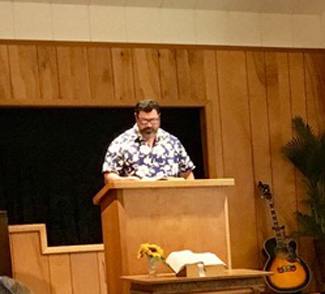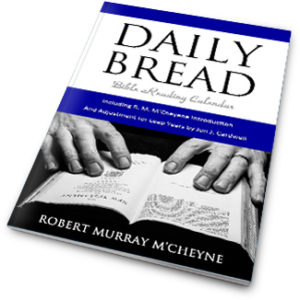How Did He Live?
Charles H. Spurgeon
“Christ’s Prayer for His People” John 17:15
New Park Street Pulpit, Vol. 1, Sermon #47,
Delivered on Sunday Morning, October 21, 1855
 Many say one to the other, “Have ye you heard that so-and-so is dead?” “How did he die?” They should rather say, “How did he live?” It may be an important question, —how does a man die; but the most, important one is, how does a man live? What curious notions people get about death! The question they ask is not whether a man dies in the Lord Jesus, but, “Has he had a very easy death? Did he die gently?” If so, they conclude that all is well. If I ask, “Had he any affection to trust in Christ?” the reply probably will be “Well, at all events, I thought he had; he had a very easy death.” People think so much of an easy death. If there are no pains in death, if they are not in trouble, and not plagued like others, they falsely conclude all to be well. But though like sheep they are laid in the grave, they may awaken to destruction in the morning. It is not a sign of grace that our dying is easy. It is natural for persons in the decay of strength to die easily. Many of the most vicious men, who have destroyed the power of their bodies, have an easy, painless death, from the fact that there is nothing to struggle against death; but, then, though they die like lambs, they wake up in sorrow. Do not put any confidence in death-beds, my dear friends; do not look on them as evidences of Christianity. The great evidence is not how a man dies; but how he lives.
Many say one to the other, “Have ye you heard that so-and-so is dead?” “How did he die?” They should rather say, “How did he live?” It may be an important question, —how does a man die; but the most, important one is, how does a man live? What curious notions people get about death! The question they ask is not whether a man dies in the Lord Jesus, but, “Has he had a very easy death? Did he die gently?” If so, they conclude that all is well. If I ask, “Had he any affection to trust in Christ?” the reply probably will be “Well, at all events, I thought he had; he had a very easy death.” People think so much of an easy death. If there are no pains in death, if they are not in trouble, and not plagued like others, they falsely conclude all to be well. But though like sheep they are laid in the grave, they may awaken to destruction in the morning. It is not a sign of grace that our dying is easy. It is natural for persons in the decay of strength to die easily. Many of the most vicious men, who have destroyed the power of their bodies, have an easy, painless death, from the fact that there is nothing to struggle against death; but, then, though they die like lambs, they wake up in sorrow. Do not put any confidence in death-beds, my dear friends; do not look on them as evidences of Christianity. The great evidence is not how a man dies; but how he lives.

 John the Baptist came in the spirit and power of Elijah (Luke 1:17). Jesus Himself said that John was Elijah, spiritually speaking (Matt 17:11-13). Moreover, Jesus said, “Truly, I say to you, among those born of women there has arisen
John the Baptist came in the spirit and power of Elijah (Luke 1:17). Jesus Himself said that John was Elijah, spiritually speaking (Matt 17:11-13). Moreover, Jesus said, “Truly, I say to you, among those born of women there has arisen 
 Calvary Baptist Church. is a gospel preaching church. Gospel preaching is the central element of our worship. We believe preaching is the primary means God uses to call lost sinners to Himself (Romans 10:14-15). We believe biblical preaching is the principal way by which Christians grow in their understanding of biblical truth (2 Timothy 4:1-4). Preaching is the chief duty of our pastor, and members of our church seek to cultivate the skill of listening in such a way as to benefit our spiritual growth.
Calvary Baptist Church. is a gospel preaching church. Gospel preaching is the central element of our worship. We believe preaching is the primary means God uses to call lost sinners to Himself (Romans 10:14-15). We believe biblical preaching is the principal way by which Christians grow in their understanding of biblical truth (2 Timothy 4:1-4). Preaching is the chief duty of our pastor, and members of our church seek to cultivate the skill of listening in such a way as to benefit our spiritual growth.
 No man clings more closely to Christ than he who is most sensible of his lost estate. Who holds the plank the tightest? Why the man who is the most afraid of being drowned. Fear frequently intensifies faith. The more afraid I am of my sins the more firmly do I grasp my Saviour. Fear is sometimes the mother of faith. One who was walking in the fields was surprised to find a trembling lark fly into his bosom. A strange thing for a timid bird to do, was it not? But there was a hawk after it, and therefore fear of the hawk made the bird bold enough to fly to man for shelter. And oh! when the fierce vultures of sin and hell are pursuing a poor sinner, he is driven by the courage of despair to fly into the heart of the blessed Jesus. John Bunyan has somewhere words to this effect, “I was brought into such a dread and horror under the wrath of God that I could not help trusting in Christ; I felt that if he stood there with a drawn sword in his hand I must even run right upon its point sooner than endure my sins.” I hope and pray that the Lord may drive you to Jesus in such a way as this if you will not be drawn by gentler means.
No man clings more closely to Christ than he who is most sensible of his lost estate. Who holds the plank the tightest? Why the man who is the most afraid of being drowned. Fear frequently intensifies faith. The more afraid I am of my sins the more firmly do I grasp my Saviour. Fear is sometimes the mother of faith. One who was walking in the fields was surprised to find a trembling lark fly into his bosom. A strange thing for a timid bird to do, was it not? But there was a hawk after it, and therefore fear of the hawk made the bird bold enough to fly to man for shelter. And oh! when the fierce vultures of sin and hell are pursuing a poor sinner, he is driven by the courage of despair to fly into the heart of the blessed Jesus. John Bunyan has somewhere words to this effect, “I was brought into such a dread and horror under the wrath of God that I could not help trusting in Christ; I felt that if he stood there with a drawn sword in his hand I must even run right upon its point sooner than endure my sins.” I hope and pray that the Lord may drive you to Jesus in such a way as this if you will not be drawn by gentler means.
 Because of the grace of God in Jesus Christ, our speech should reflect the grace of Christ’s person and work. It’s not automatic. Experience informs us of this flaw; and more than that, God, in His holy Word says so, since He states, “Let your speech always….” It must be both a conscious decision as well as a constant decision.
Because of the grace of God in Jesus Christ, our speech should reflect the grace of Christ’s person and work. It’s not automatic. Experience informs us of this flaw; and more than that, God, in His holy Word says so, since He states, “Let your speech always….” It must be both a conscious decision as well as a constant decision.


Recent Comments